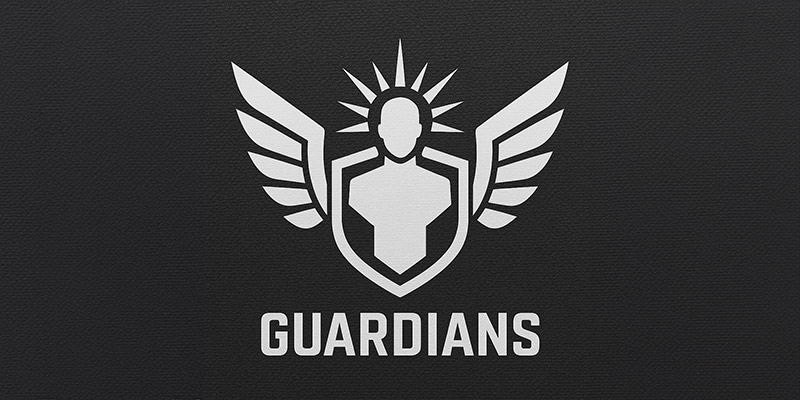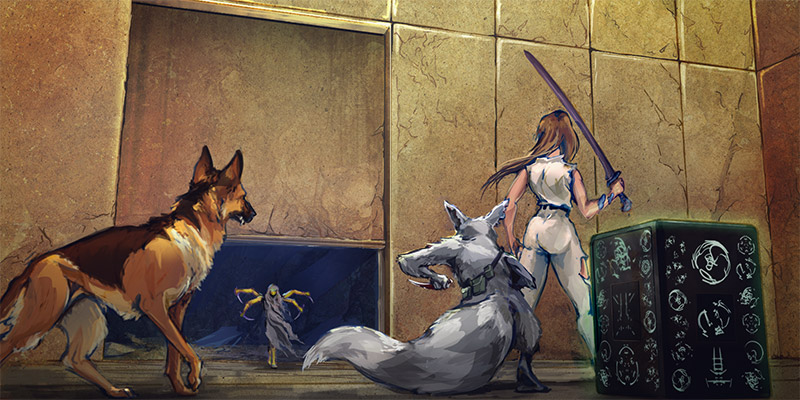Posted by Ilona
https://ilona-andrews.com/blog/the-inheritance-chapter-12-part-2/
https://ilona-andrews.com/?p=39990
It took less than a minute for the skelzhar to die. I disengaged once the cat collapsed, but Jovo was still stabbing it, drenched in blood and lost to a frenzy.
I made my way back to the gress and crouched by him, holding the amulet by the chain. The small metal disk rotated, suspended from my fingers. The gress’ eyes locked on it. His breathing was labored. The stumps of his arms weren’t bleeding. The shroud was devouring him from within, trying to repair itself, and it was draining his blood.
The Kael Order believed that during the final rite of their training their god sent a holy demon warrior to inhabit their bodies. The demon raged, and the best way to honor and satisfy it was to deliver pain and suffering. It was a very convenient construct that absolved the Kael’gress of all moral responsibility for their actions.
The ruling elite had to maintain control, and that’s where the amulets came in. According to their doctrine, the little metal circles literally contained their souls, safeguarding them from harm, and in case of the Kael, the holy fire of the demon warrior’s aura. A gress who lost the amulet was but “a bag of meat,” and their soul would never be reborn, remaining bound to the amulet for eternity.
I let the amulet dangle.
“Where is your witness?”
He didn’t answer. He was still focused on the amulet.
“Bring your witness to me or die soulless.”
His gaze shifted to my face. He squeezed out a single word.
A small metal sphere descended from the ceiling and hung in front of me. I sliced through it with my blade. It fell apart, spilling its electronic guts onto the stone floor. The gress recorded their kills, both to prove they completed their contracts and to boast.
I looked back at the gress. “Who hired you?”
He took a deep breath. “Rakalan.”
No reaction from the power within me. The gem was still dormant. “Did the Rakalan make this breach?”
“Rakalan do not invade. They are the invaded.”
“Who does the invading?”
“Tsuun.”
“How many worlds did Tsuun invade?”
“More than six of greater of six.”
Greater of six in their counting system was six squared, so thirty-six. Six of thirty-six was two hundred and sixteen. So many…
“Why do the Tsuun invade? What do they want?”
He blinked slowly. “Power. Resources. Territory.”
He was fading fast. I had to get to the important questions.
“What were the terms of your contract?”
“Find sadrin. Bring her back. Kill her if you fail.”
“Is that why you hunt me?”
“Yes.” His voice was a soft sibilant whisper. “You are sadrin. I must take you back.”
“How do you know I am a sadrin?”
His breath was a soft rasp. “I feel it…”
That wasn’t good. If he felt it, did that mean anybody could feel it?
“Was the previous sadrin a Tsuun?”
“She was Rakalan.”
“Her own people hired you to kill her?”
“Yes.”
“Why?”
“Rakalan submitted. She did not. Rakalan resisted for greater of greater six of their rotations. Their sadrin held much knowledge. She was of value to Tsuun. Rakalan failed to deliver her. They feared destruction.”
The Tsuun had invaded the Rakalan world, and the Rakalans fought them off for one thousand two hundred and ninety-six years. In the end, the Tsuun won the interdimensional war, and the Rakalan surrendered. Turning over their sadrin must’ve been a condition of that surrender.
A death rattle clamped the gress. He reached for the amulet with a handless arm.
“How did you come to be here?”
“Sadrin fled. We pursued.”
“What makes sadrin valuable?”
“Knowledge. Knowledge accumulated, knowledge passed from parent to chosen offspring, again and again.”
“Why didn’t the Rakalan order you to bring the knowledge back?” They could’ve just carved that stone out of my mother’s head.
“Cannot be taken. Only gifted. If not gifted, knowledge dies with sadrin.”
I always wondered why the last Kael’gress had switched targets back in the cave. He was fighting my sadrin mother, and then he abruptly tried to kil me. It was because he knew he would lose the fight, and I was the only other creature in the cave capable of becoming a sadrin. Bear wasn’t sapient enough.
The gress trembled.
“What does it mean to be sadrin?” I asked.
His voice was barely audible. His eyes were desperate. “Everything.”
I placed the amulet on his chest.
“You can let go now. I will make sure the shroud of the holy power cleanses your passing.”
Relief shone in his eyes. He took one last shuddering breath and went still.
I flexed. The gress no longer glowed red. In the moment I had scanned him on that stone breach, I wanted to go home, and I wanted answers. My talent tagged him as key to either one or possibly both. Now the way home was clear. I had my answers, too, but they just led to more questions.
Somewhere out there a civilization named Tsuun waged interdimensional war. They invaded world after world. They probably had it down to routine now. Earth was just the latest of their targets. Some worlds must’ve been conquered immediately. Others, like the Rakalan, fought back for centuries.
When I sank into the gem, looking for the information on the gress, moving through their world didn’t feel like accessing a specific memory of a single being. It felt like a compilation of memories from different individuals, woven into a semi-cohesive whole. Like an encyclopedia article come to life, a summary of collected information from many sources presented in a concise format.
The assassin said that the Rakalan resisted for almost thirteen hundred years, which was why my mother was “of value.” This and the memories in the gem suggested that my mother wasn’t the original sadrin. She inherited her knowledge just like I inherited mine. If my guess was right, each sadrin added to the gem and passed that gift to the next, on and on, through generations. The longer their world resisted, the more knowledge the gem accumulated, and the more value it had.
When the Rakalan surrendered, my mother must’ve fled into a Tsuun breach linked to Earth. I had no idea how she ended up here, but she did, and the gress chased her into it. It had to be more than just an attempt to escape. What I saw of the gress was just a tiny sample of the information hidden in the gem. She had access to so much, she could’ve gone anywhere, and yet she decided to enter this breach. She didn’t just choose me, she chose humanity. She picked Earth and gave us this priceless gift. Her world’s war against the invaders was done, but ours was just beginning.
She let herself die. Had she kept the gem, she would’ve survived. I was sure of it. She didn’t want to continue, so she died in the breach, the means by which the Tsuun invaded her world, betrayed by her people, never knowing if I and the knowledge she gifted me would survive.
I felt strangely hollow.
The gress didn’t say “sadrin.” He said “their sadrin.” That meant other worlds had sadrins as well. Was that something that occurred naturally or just in response to the invasion? Whatever the answer was, the Tsuun wanted sadrins. Perhaps they had a way to harvest our knowledge.
The Rakalan resisted for almost thirteen centuries. Thirteen hundred years of war. The enormity of it slammed into me. I sat down on the ground by the gress’s body. My legs refused to hold my weight.
How many gates was that? How many deaths? Generations and generations, born with the war already burning and dying while it still raged. Thirteen hundred years. We’ve been fighting for only ten, and it already completely changed our lives. Over a thousand years of this?
And in the end, the Rakalan still lost and gave up their sadrin. If the Tsuun found out I existed and carried all of that generational knowledge in my head, they could pressure the Earth to turn me over.
Would my planet give me up? Was there even a point to going on?
Something nudged me. Bear brought me a bloody feline femur with shreds of flesh on it. The claw marks on her back weren’t bleeding anymore.
I flexed on autopilot. Well, the meat wasn’t poisonous, and she had already eaten some of it, so it was probably too late to make a fuss about it.
Bear nudged me again.
“Hey, Bear.”
She dropped the femur at my feet. I crouched. I’d read somewhere that dogs didn’t like being hugged. I had hugged her before because I was too far gone, but I was calm now, so I leaned against her, stroking her side. She leaned back against me and licked my cheek.
The flat, empty feeling inside me faded.
I felt more like myself.
There were so many fucking questions I didn’t have the answer to. What happened to the worlds after the Tsuun won? They could be destroyed, occupied, vassalized… Did anyone ever win against the Tsuun?
The answers to all those questions were likely in my head and out of reach for now. The most pressing question was, what do I do now? How do I fix this mess?
Staggering out of the gate and announcing to the world that I was sadrin was out of the question. I had no intention of becoming a bargaining chip. Nor would I let the government collect me like a weird specimen or turn me into a weapon by keeping my kids hostage. If they understood what I was, I would face the choice of being eliminated, confined, or controlled for the rest of my life. Not going to happen.
My priorities were the same: get out of the breach alive and return to my children. But now there was one final part to that awesome plan. Once I managed to escape, I would end this invasion.
There would be no thirteen centuries of conflict. My children deserved a safe future. I deserved it.
The Tsuun wanted my mother because she was a threat. I would use her legacy. I had to get out and study the gem. I needed to learn what it contained, how to access it quickly, and where to find the information I required. I needed to know what we faced. I needed to learn the limits of my new body. All of this meant I would need to hide until I accomplished that.
Bear and I had been stuck in this breach for at least a week. Whoever had the rights to this breach – whether it was still Cold Chaos or some other guild – would be sending a new team in. For all I knew, they were already inside. That team would attempt to blast through the passageway London collapsed, because they would want to recover the corpses and the incredibly valuable adamantite.
London’s face flashed before me. Soon. We would meet very soon.
When the second assault team entered that cave, they would find the corpses of four alien humanoids and my mother. I couldn’t let that happen. I had to avoid anything that drew attention to the existence of sadrin.
If our government already knew about the Tsuun and other sophonts on the other side of the breach and they were actively hiding it, they could disappear the entire assault team for just discovering the bodies. Not to mention that the devourer shroud required living hosts. By now it would have fallen into a semi-dormant state from starvation and the moment a human approached one of the gress corpses, the shroud would strike. People would die.
London was pond scum, Melissa was a selfish coward, but the rest of the Cold Chaos members didn’t deserve to die or disappear if I could prevent it.
I looked at the anchor. It still loomed large in my mind’s vision, an ominous evil thing that had to be destroyed. If I shattered it, the gate would collapse in three days, but it wouldn’t solve the problem of the bodies, because it left enough time to search the mining site. The bodies would still be found.
Besides, everyone would know that I had destroyed the anchor. The anchors didn’t just spontaneously collapse on their own. I couldn’t stagger out of the breach and have it collapse behind me. My life would be over.
The compulsion burned in me. I had to destroy it.
No. I was my own person. I had other things to do. I had to clean this up. The sooner the better.
I turned to the body of the gress, squeezed the amulet until it clicked, and spoke a single word in an alien language. “Irhkzurr.”
The amulet on the gress’ exposed chest turned red, then orange. The assassin’s flesh sizzled. The devourer shroud hissed, trying to crawl away from the heat and failing, trapped by its roots with the alien body.
The amulet grew yellow, then finally a blinding white, and the corpse turned to ash, the grey shroud writhing as it too was incinerated. A moment and the pile of ash collapsed onto the floor.
Jovo stood up on the dead skelzhar’s head, his bracelet clutched in his hand. He was splattered with blood and his eyes looked a little wild.
I gave him a little wave.
The lees hopped off the corpse of his enemy, shook himself, flinging blood everywhere, ran over to me, and showed me the bracelet. It was a metal band about two inches wide, that looked to be made of copper. Thin red lines crossed it, carving it into smaller sections.
He grinned at me.
“Home,” I said.
“Home!”
He jumped from foot to foot, spinning in place, then turned around, and hugged me. “Ada.”
“Jovo.”
He took my hand, squeezed it to his chest, and pointed to the exit, toward the gate. “Home.”
I nodded. “My home.”
Jovo put his paw on his chest and said, pronouncing the words very carefully. “Help.” He pointed at me. “Ada. Dan-ge-rous. Help.”
He flexed his arms and waved his knives around.
It took me a minute. My nice new friend from a different world, who helped me kill an assassin from an alien planet, was determined to walk me home. Because it wasn’t safe. Gentleman Jovo.
I sat on the floor and laughed.
The post The Inheritance: Chapter 12 Part 2 first appeared on ILONA ANDREWS.
https://ilona-andrews.com/blog/the-inheritance-chapter-12-part-2/
https://ilona-andrews.com/?p=39990

















